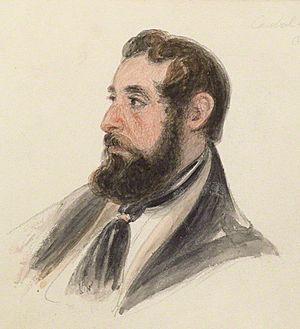Arthur Conolly facts for kids
Quick facts for kids
Arthur Conolly
|
|
|---|---|

Arthur Conolly, by James Atkinson
|
|
| Born | 2 July 1807 London |
| Died | 17 June 1842 (aged 34) Bukhara |
Arthur Conolly (born July 2, 1807, London – died June 17, 1842, Bukhara) was a British officer, explorer, and writer. He was a captain in the 6th Bengal Light Cavalry. This was a part of the army serving the British East India Company. He went on many trips to explore Central Asia. Conolly also created the famous phrase The Great Game. This term described the big competition between the British Empire and the Russian Empire. They were both trying to control Central Asia.
Arthur Conolly's Life Story
Arthur Conolly was related to William Hay Macnaghten, who worked for the British East India Company. When Conolly was sixteen, he sailed to India. He was a young cadet, learning to be an officer.
In July 1840, Conolly wrote a letter to Major Henry Rawlinson. Rawlinson had just become a British agent in Kandahar, Afghanistan. In his letter, Conolly wrote:
You've a great game, a noble game, before you.
Conolly believed Rawlinson's new job was a chance to help people in Afghanistan. He hoped that Britain would work with Russia and other countries. He wanted them to bring fairness to the region.
Conolly often traveled in disguise to gather information. He used the name "Khan Ali." In late 1829, he left Moscow and traveled through the Caucasus region. He then went into Central Asia. He reached Herat in September 1830 and India in January 1831. In 1834, he wrote a book about his journey. This book made him well-known as a traveler and writer.
In 1841, Russia was becoming more powerful in Central Asia. Conolly tried to get the different local rulers, called khanates, to work together. But he was not successful. In November 1841, he was captured while trying to rescue another British officer. This officer was Lieutenant Colonel Charles Stoddart, who was held in Bukhara.
The ruler of Bukhara, Emir Nasrullah Khan, ordered their execution. Conolly and Stoddart were accused of spying for the British Empire. They were both beheaded on June 24, 1842. This happened in front of the Ark of Bukhara. Arthur Conolly's older brother, Lieutenant Henry Valentine Conolly, was later killed in India in 1855.
Conolly's Lasting Impact
In 1845, a man named Rev Joseph Wolff traveled to Central Asia. He wanted to find out what happened to Conolly and Stoddart. Wolff barely escaped with his own life. He later wrote a detailed book about his travels. This book made Conolly and Stoddart famous in Britain for many years.
A National Portrait Gallery in London has a [portrait] of Conolly. It was painted by James Atkinson. Conolly's diaries from 1840–1842 are kept in the British Library. So are his letters and reports to Sir John Hobhouse and William Cabell. His letters from 1839 to Viscount Ponsonby are at Durham University Library.
Images for kids
 | Janet Taylor Pickett |
 | Synthia Saint James |
 | Howardena Pindell |
 | Faith Ringgold |


